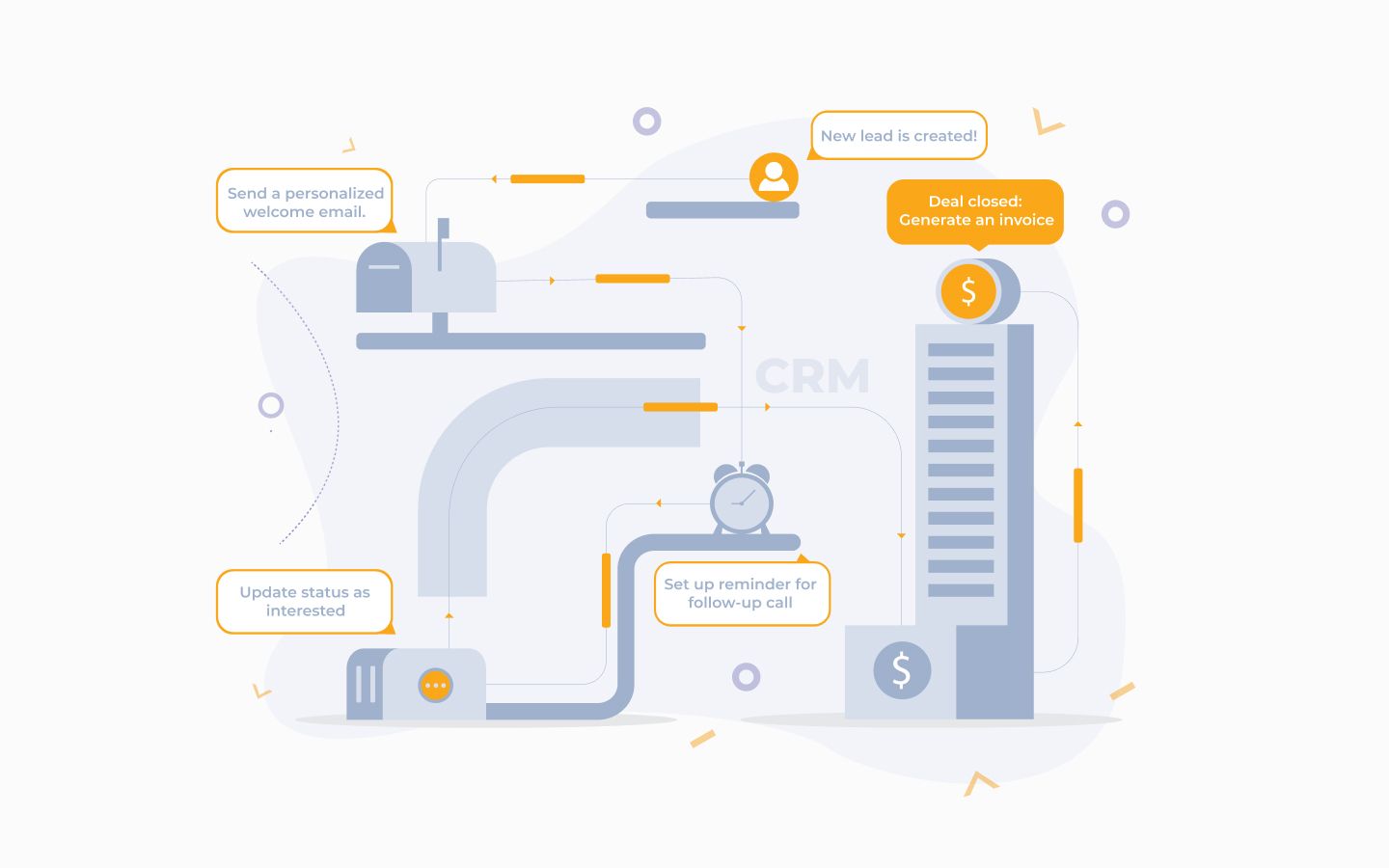New technologies come and go. However, the constant need for effective customer relationship management software will never cease. To be more efficient, productive, and effective, businesses will need CRM systems that can help them better retain and manage current customers while attracting new ones.
What is customer relationship management?
Customer Relationship Management (CRM) is the process of managing customer relationships. It allows a business to track contacts and keep track of prospects and customers, leading to higher sales and happier customers. Customer relationship management process involves storing and managing contact information, such as emails, phone numbers, and future or past business relationships.
What is a CRM?
Customer relationship management system stores all interactions with potential customers. It keeps track of everything from someone’s first visit to your website to how long they looked at your sales proposal.
But it’s not just a list of names and email addresses — it’s much more than that.
A good example of a CRM tool is Salesforce, a popular CRM system used by more than 150,000 businesses worldwide.
Benefits customer relationship management system can provide to your business
- Maintain a centralized database for all of your salespeople: CRMs are a must for your sales team. The ability to manage all prospect information in one place gives your reps access to all the potential customers they need to follow up with and closes deals much more quickly.
- Manage all interactions in one place: All of your customer interactions can be tracked through a CRM system. This keeps your sales team organized and accountable for every interaction they have with a buyer, whether it's a phone call, e-mail, or in-person conversation. For example, your CRM can identify when to contact a prospect and help reps remember if they've already reached out.
- Automate data entry processes to increase efficiency and save money: With a CRM, you can make sure every communication with customers is tracked right away. It's all automated in the system, saving everyone on your team time and energy. Additionally, CRMs provide deal statuses and updates, which are automatically carried out. It can all be done without any manual input, too!
- Streamline customer data: CRMs allow your team to easily track leads and communicate with each customer at every step of the sales cycle. In real-time, reps will be able to see if contacts have visited your website. They'll also be able to see if they downloaded content from the site.
- Reports: CRM software helps sales reps organize data about prospects and deals. Using a reporting feature, reps can better manage their pipelines, deals, and contacts. They can also evaluate their performance and track their goals and needed work to reach quota.
- Sales performance forecast: The key to any successful sales organization is the ability to develop a strategic plan that incorporates a strategy. With detailed CRM reports, sales leaders can identify key metrics such as revenue and profits. These numbers offer a clear picture of how well your business is doing and what it will take over the next quarter or year to attain your objectives.
And in case your sales organization needs additional convincing to adopt a CRM, here are a few statistics that further prove their value:



What are the different types of CRM?
There are three main types of CRM software are operational, analytics and collaborative. Here’s more:
- Operational CRM: Gives you a detailed picture of each customer's journey through sales and marketing automation.
- Analytical CRM: Analyzes and identifies trends in client data to assist you in making better business decisions.
- Collaborative CRM: Customer information is organized and shared with multiple stakeholders.
How to decide the best one for your business?
A free CRM could be the best place to start learning about CRM. They are, after all, free!
You can learn CRM at your own pace without the burden of making a financial commitment. You'll be able to determine the features most important to you and "play around" (for free) before deciding on a vendor.
This is important since a CRM framework does not simply "do its thing" when it is inserted into a workflow. People must work with CRM and recognize it to reap real, positive business benefits.
CRMs that are available for free are typically feature-limited, or time-limited versions of a paid complete edition. Deciding on a CRM can be difficult, so vendors have free versions to help take the guesswork out of the process—it's a perfect way for users to test a CRM to see if it's a good match before committing entirely.
Understanding how customer relationship management works can, in the end, open up a slew of new opportunities for your business.
One of the most significant investments you can make as a small business owner is in people— employees and customers. Customer relationship management (CRM) software is one easy way to help people. CRMs make it easier for employees to handle customer and business experiences daily, resulting in a more robust customer experience. Happy internal customers equal satisfied external customers. At the very least, that is the objective.
Free CRM systems allow you to test out a platform with your team to see whether you can get value out of it without having to spend any money upfront—which is particularly useful if you're a small company or a budding startup on a tight budget.
There's no excuse you shouldn't check it out because it's free! Here are a few of the best free customer relationship management software, all of which offer tempting free plans:
- Zoho CRM for scaling your business
- HubSpot CRM for businesses wanting lots of integration options
- Insightly for project management
- Capsule CRM for an easy-to-use free CRM
- Agile CRM for free marketing capabilities
- Streak for managing contacts from a Gmail inbox
- Apptivo for all kinds of businesses and those who appreciate good customer service
Conclusion
Using a CRM software system will boost productivity among reps, keep all information regarding prospects in a central location, help your team close more deals, and foster important business relationships. The benefits of CRM software are invaluable for sales reps. It allows companies to improve their workflow, increase productivity and strengthen sales pipelines for enhanced customer service.
To know more about how to use your CRM systems effectively and integrate them with your existing systems you can get started for free on our platform and integrate your systems and applications within no time or you can schedule a demo call with our automation expert for specific use cases.








